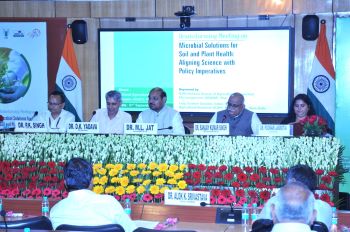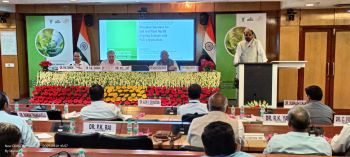1 September 2025, New Delhi
The Crop Science Division of the Indian Council of Agricultural Research (ICAR) and the ICAR–National Bureau of Agriculturally Important Microorganisms, Mau, jointly convened a brainstorming meeting on ‘Microbial Solutions for Soil and Plant Health: Aligning Science with Policy Imperatives’ at NASC Campus, New Delhi.
The meeting was chaired by Dr. M.L. Jat, Secretary, (DARE) and Director General, (ICAR), and co-chaired by Dr. D.K. Yadav, Deputy Director General (Crop Science) ICAR, Dr. A.K. Nayak, Deputy Director General (NRM), ICAR, Dr. S.K. Singh, Deputy Director General (Horticulture), ICAR, and Dr. Rajbir Singh, Deputy Director General (Agri Extension), ICAR.

In his address, Dr. Jat underlined both the challenges and opportunities in advancing biological solutions in agriculture. Stressing the need to delink bioinputs from existing fertilizer and pesticide regulations, he advocated for a dedicated and unified legislation in the form of a Biological Act. He further proposed the creation of an ICAR-led toxicological data platform to facilitate microbial registration and accelerate the growth of the sector.
The session began with a welcome address by Dr. Poonam Jasrotia, Assistant Director General (Plant Protection & Biosafety), followed by a thematic presentation by Dr. Alok K. Srivastava, Director, ICAR–NBAIM, on “Microbial Research in India: Progress, Constraints, and Future Prospects.”
Contributions on the role of microbials in soil and plant health management were made by Dr. S.R. Mohanty, Head, Soil Biology Division, ICAR–Indian Institute of Soil Science, Bhopal; Dr. S.N. Sushil, Director, ICAR–National Bureau of Agricultural Insect Resources, Bengaluru; and Dr. Raman Thangavelu, Director, ICAR–National Research Institute for Integrated Pest Management, New Delhi.

The meeting drew wide participation from Assistant Director Generals of various ICAR divisions, institute Directors and scientists, representatives from DARE, CIB&RC, and the agro-industry. Deliberations focused on the current status of microbial bioinput production in India, strategies to accelerate farmer adoption through simplified technology transfer, streamlining of regulatory frameworks, and strengthening of public–private partnerships.
(Source: ICAR–National Bureau of Agriculturally Important Microorganisms, Mau)








Like on Facebook
Subscribe on Youtube
Follow on X X
Like on instagram